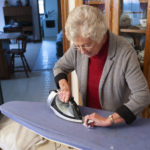Women do incredible things. This section features the stories of women who are a part of the Southeast Missouri community by way of living here, being from here or passing through. We hope these stories inspire you to connect with others and that they encourage you to be who you are in the world. We need you and your unique gifts.
This story was first published in the January 2020 issue of “The Best Years (TBY).”
By Sarah DeClue
What is a fidget mat? It is a quilted piece of fabric about the size of a table place mat that provides sensory input and stimulation for Alzheimer’s patients to encourage engagement with the world around them. It can be adorned with materials of different textures such as soft Velcro, corduroy or velvet and is covered with items that can be manipulated, like ribbons, medals or even small toys. Zippers, buttons and fasteners that open and close are also included so the user of the mat can practice everyday skills.
Church Women United of Cape Girardeau County, a local group of women from different Christian denominations who come together to do service projects for people in the area, makes and distributes fidget mats to people in local nursing and assisted living homes. Their story of involvement with this project goes like this: one member, Carol Simon, received a flyer from her sister in Florida about a church in the area planning a blitz day to make fidget mats for Alzheimer’s patients. Not long after that, Simon visited her husband’s aunt at the Bethesda Southgate nursing home in St Louis. Simon noticed a fidget mat on her lap and that she continually ran her fingers over the attached ribbon.
“I said, ‘Oh, my gosh, [my sister] just sent me this [idea]; they are doing it in Florida, and no one here has even heard about it,’” Simon says. “So I brought it to Church Women United. One lady got really excited and made one for her sister.”
Simon rallied the Church Women United around this project and, just like that, assembling and delivering fidget mats for Alzheimer’s patients in nursing homes became the organization’s most recent endeavor. If purchased online, fidget mats can be quite expensive at an average cost of $35 to $110 each on Amazon; the Church Women United have saved this cost for multiple families by making and delivering 57 mats to The Lutheran Home, Jackson Manor, Monticello House and The Veterans Home.
Grace United Methodist received CWU newsletter and took it upon themselves to make 18 and took them to The Arbors at Auburn Creek nursing home in Cape Girardeau.
The local chapter of Church Women United of Cape Girardeau County was organized in 1942, the year after the national group was formed, for celebrating unity in diversity and fostering peace in the world. Church Women United’s mission states, “The organization is unified by a common faith in Jesus Christ, committed to the empowerment of women and works for global justice and peace.” In addition to making the fidget mats, they tangibly impact women through assembling kits for hygiene and school, collecting funds for MO Women’s Prison Packs and giving scholarships to women, often single moms going back to school.
In making the fidget mats, the women say they encountered surprisingly few barriers considering the size of such a project. For the endeavor, they used the leftover quilting supplies from a past project. Although only a couple of members know how to sew, those who can’t sew organize supplies, iron and pin items onto fabric to be sewn down later. The women spend time theming each mat, dedicated to providing something Alzheimer’s patients can connect to, from military and farming to horses and grooming. Each mat is special and unique. Fidget mats are grounded in and supported by brain research, and the women see the difference they make on the faces of nursing home residents, as well as the residents’ family members and friends.
Julie Poston, activity director at Jackson Manor, and Diane Wicker, life enrichment coordinator of the Memory Care unit at The Lutheran Home, say most of the residents who receive the mats no longer communicate verbally and tend to get agitated and fidgety with their hands. With the use of the fidget mats, however, both directors have seen increased eye contact and even smiling.
Poston, whose mother has Alzheimer’s, often uses the themes of the mats to encourage.
“I’ll talk to [the patients] about the feel of the blanket and ask what it reminds them of — anything to get them talking, engaged and stimulated,” she says. “They may not answer, but they give me eye contact or even give me a smile.”
Wicker has noticed the impact on those who are not as advanced in the disease and can still communicate verbally. She says they are enamored with the mats, admiring the seamstress work, manipulating the items on the mat and even folding them over and over as they reminisce about tasks they did at home years before. For residents with more advanced Alzheimer’s, the fidget mats serve a somewhat different purpose.
“They tend to get fidgety with their hands,” Wicker points out, “and the mats give them something to fool with using their hands.”
Church Women United is an impactful group, to be sure. They do more than provide for others, however: they provide community for one another with a sense of purpose. They feel useful in the world and grateful for each other. These women have an inherent ability to work together with shared leadership, cooperative creativity and a genuine appreciation for what each of them brings to the table. Church Women United is an example of what true and purposeful collaboration looks like.

